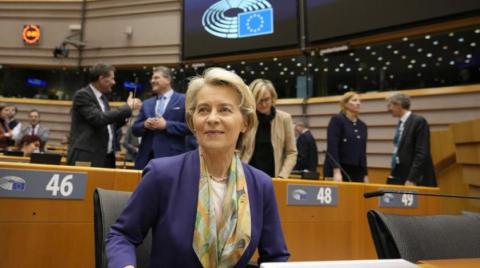
As French President Emmanuel Macron prepares for his big trip to China in the New Year, a huge debate is brewing in Europe about the bloc’s policy on Beijing, which might well have reached a historic tipping point.
Macron will be just the latest senior European figure to visit China in recent months. In late November and early December, European Council President Charles Michel was in Beijing. His visit came amid perceptions of intra-EU splits on China, following a visit in November by German Chancellor Olaf Scholz.
Scholz’s visit, the first to China by a G7 leader since the start of the COVID-19 pandemic, reflected the importance of Germany’s trade ties with China. Between January and June this year alone, German businesses invested more than €10 billion ($10.6 billion) in China, according to the German Economic Institute.
While the trip was largely uneventful, it did give rise to perceptions of intra-EU, and indeed intra-Western, splits in attitudes toward China. Germany, especially under the long chancellorship of Scholz’s predecessor, Angela Merkel, has long been the primary advocate of European, and wider Western, economic engagement with Beijing.
That long-standing German strategy toward China has, however, come in for much stronger criticism since Merkel’s retirement. A perception that Scholz might be seeking to keep much of her China policy intact has been widely criticized. For instance, Ivo Daalder, the Obama-era former US ambassador to NATO, has warned that Germany is “headed for a collision” with the administration of President Joe Biden.
While the diplomatic atmosphere around these recent European trips has been upbeat overall, bilateral relations have been shaken since the coronavirus crisis began, with a significant spike in tensions that has not been made any smoother by China’s qualified support for Russia over Ukraine.
The list of issues that Beijing and Brussels have been at odds over is not getting any shorter and includes the imposition of a national security law in Hong Kong; alleged human rights abuses in Xinjiang; and a long-negotiated Chinese-EU Comprehensive Agreement on Investment, the ratification of which is currently “on ice.”
These challenges are set in a context in which Michel and other EU officials in Brussels see a clear need to strengthen a common Europe-wide approach to China, given that high-ranking Chinese officials have engaged bilaterally with a wide range of EU member countries in recent months.
There have long been European concerns that China’s foreign policy focus on the continent is aimed at dividing and ruling, undermining the EU’s collective interests.
Take the example of China’s Belt and Road Initiative, which numerous EU member states, including Croatia, the Czech Republic, Hungary, Poland, Greece, Malta, Portugal, and G7 member Italy have signed up to. This is despite a long list of reservations Brussels has about the scheme, not least given the frustrations over the perceived slowness of Beijing to open up its own economy, and a wave of Chinese takeovers of European firms in key industries.
So despite proliferating pressures, it is not yet inevitable that relations will deteriorate significantly. Both the EU and China can potentially still gain from a deep partnership on key issues.
Andrew Hammond
Key trends are increasingly apparent in China’s external interventions in Europe. For instance, it is becoming increasingly clear that Beijing is tailoring its approach around the bespoke needs of individual states or blocs of countries. Furthermore, Chinese overtures to Europe are coming with a clear quid pro quo, as underlined by countries signing up to the BRI in exchange for Chinese investment.
While Michel left Chinese President Xi Jinping with clear, hard-hitting messages on these issues, he and other European leaders do not want to forgo any remaining upsides to ties. Both sides are therefore keen to try to stress areas of common interest and cooperation, including economic multilateralism and efforts to tackle climate change.
On the former issue, China still hopes that the Comprehensive Agreement on Investment might be concluded, despite opposition from the Biden administration. However, the prospect of ratification being kicked into the political long grass in Brussels is growing.
As discussions at the UN Climate Change Conference, COP 27, in Egypt showed, global warming is an issue on which both sides have long had a largely constructive dialogue. One reason why bilateral discussions on climate change have, mostly, been so cooperative is that, fundamentally, both sides share a vision of a prosperous, energy-secure future in a stable climate, and recognize the need for collaboration to realize this.
Their 2015 bilateral agreement, for instance, agreed to intensify cooperation in domestic mitigation policies, carbon markets, low-carbon cities, greenhouse gas emissions from the aviation and maritime industries, and hydrofluorocarbons.
With appropriation vision and commitment, both Xi and his European counterparts recognize there remains a potentially big “win-win” opportunity on the horizon from accelerating the transition to a low-carbon future, including emissions trading, and bolstering economic growth in both China and Europe.
So despite proliferating pressures, it is not yet inevitable that relations will deteriorate significantly. Both the EU and China can potentially still gain from a deep partnership on key issues.
Yet, politics might not allow for this and much might now depend on how the conflict in Ukraine develops, including how far Beijing potentially goes in showing its support for Moscow.
• Andrew Hammond is an associate at LSE IDEAS at the London School of Economics.












